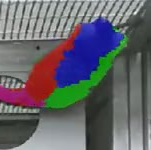This work, funded by NIH, is part of joint project “Development of an Integrated System for Monitoring Home-Cage Behavior in Non-Human Primates” led by Robert Desimone and Guoping Feng. Traditional methods for behavioral analysis includes observation of long video sequences with scientists marking events of interest by hand. These types of approaches do not scale to days of video, nor are they amenable to crowd-sourcing methods due to the need for technical expertise.
Under this project we aim to develop automated and semi-automated analysis methods (and associated algorithms) that enable sophisticated long-term behavioral analysis of animals in their home environment. In turn, automated methods will speed the development and application of new animal models to the study of social interaction disorders including autism and Phelan-McDermid syndrome.
SLI is pursuing 3 inter-related research thrusts as part of this project: (1) multi-object tracking, (2) multi-modal sensor integration, and (3) interaction analysis for behavior modeling.
Multi-object Tracking
We address these issues with a Bayesian nonparametric approach to multi-object tracking. Our methods are capable of tracking multiple targets as well as multiple body parts of each target. Inference is performed over the joint posterior of latent states, enabling uncertainty estimates in the number of object parts as well as the locations (possibly occluded) of each target.
Nonparametric Bayesian Parts Modeling
Project Title: Development of an Integrated System for Monitoring Home-Cage Behavior in Non-Human Primates
Acknowledgement: This research was partially supported by NIH (Award No. 1R01MH111916-01A1)
